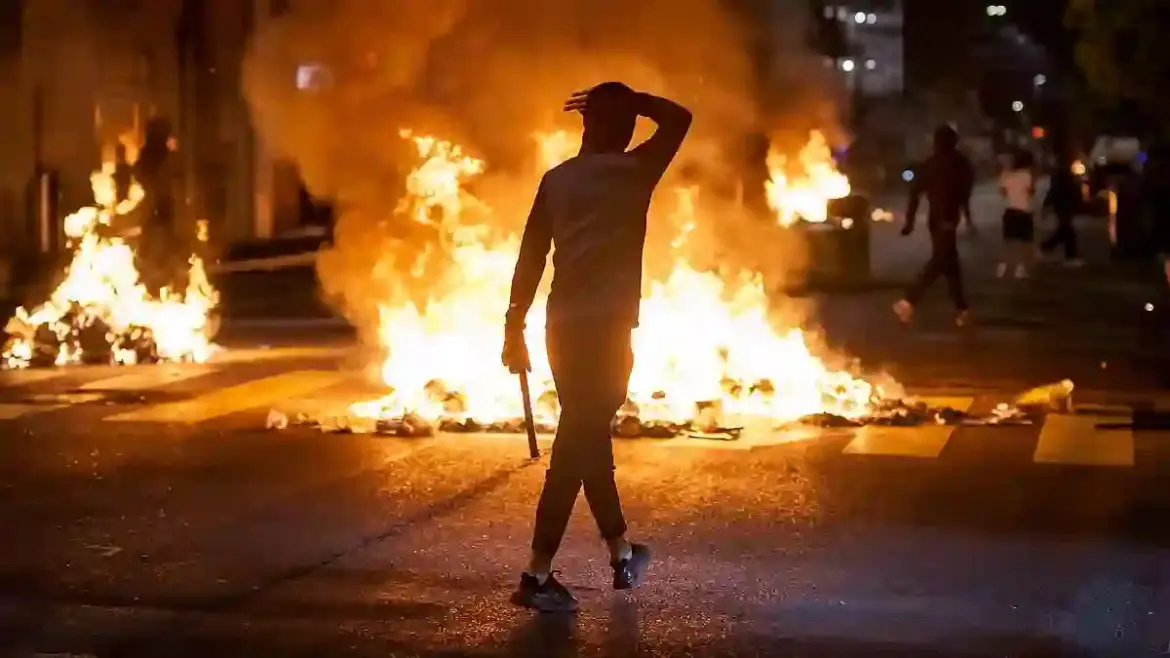Switzerland, often thought of as one of Europe’s most peaceful nations, is now facing a wave of anger and street violence.
What began as grief and outrage over the death of a teenager in Lausanne has quickly spiraled into two nights of riots—and experts fear this may only be the beginning.
The Incident That Sparked the Riots
The trouble started after 17-year-old Marvin M, a Swiss resident with a migrant background, died in the early hours of Sunday morning.
He was riding a scooter, allegedly stolen, while fleeing police when he crashed into a garage wall.
Despite emergency crews’ attempts to save him, he died at the scene around 3:45 a.m.
His death has fueled suspicions of police racism, a claim already festering in the city.
In fact, Marvin’s case was the third death linked to police action in Lausanne in less than three months—five of the seven similar deaths in the wider Vaud region since 2016 have involved young men of African descent.
Clashes in the Streets
In the hours that followed, Lausanne erupted. On Sunday night, around 100 masked youths clashed with riot police, hurling fireworks, setting trash cans alight, and damaging buses.
By Monday night, the unrest had swelled, with up to 200 protesters setting up flaming roadblocks, torching vehicles, and pelting officers with stones.
Police responded with tear gas, rubber bullets, and a heavy presence, but the anger refused to die down.
Systemic Racism Allegations
Protesters’ fury was intensified by recent revelations that several Lausanne police officers had been suspended after racist, sexist, and discriminatory messages surfaced from private WhatsApp groups.
Even city officials admitted there was a wider issue.
Lausanne Mayor Grégoire Junod openly acknowledged “systemic discrimination” within the force, stressing the need for deep cultural change to restore public trust.
A Sociologist’s Warning
Professor Sandro Cattacin of the University of Geneva believes this unrest is far from over.
Speaking to the Daily Mail, he warned that other groups—especially radical anti-capitalist factions—could exploit the situation to escalate violence further.
“I expect riots again next week,” he said, adding that future clashes could be even more brutal, both from protesters and the police.
He argued that the only way forward was to open dialogue between the police and marginalized youth before the tension becomes unmanageable.
Far-Right Voices Add Fuel to the Fire
While some call for understanding, Switzerland’s far-right has taken a harsher stance.
Politicians from the extreme right were quick to demand tougher crackdowns, openly questioning the place of migrants in Swiss society.
Cattacin warned that such rhetoric only deepens divisions and risks inflaming the violence.
Police and Prosecutors Push Back
Authorities have tried to cool tempers by clarifying details of the crash.
Prosecutors said two motorists witnessed the accident and confirmed there was no direct contact between Marvin’s scooter and the police vehicle chasing him.
They added that the teen had lost control at high speed in an 18 mph zone.
Marvin’s family, however, strongly denies claims that the scooter was stolen, insisting he was innocent.
His mother told local paper 24 Heures that he was not a thief, while his brother posted an emotional tribute online, writing: “You should be with me, at home, in our room, which we’ve always shared.”
A criminal investigation into the circumstances of his death is now underway.
Broader Tensions Over Migration
Over the last decade, Switzerland has taken in more than 200,000 refugees, many from war-torn regions such as Eritrea, Somalia, Syria, and Afghanistan.
While once praised as a humanitarian example, this influx has created new social strains.
Now, with Switzerland’s government moving to cap its population at 10 million under pressure from the hard-right People’s Party, simmering unease about immigration is spilling onto the streets.
What Comes Next?
For now, Lausanne remains tense, with both protesters and police bracing for more unrest.
Experts believe the situation could escalate unless authorities find a way to address the deep mistrust between migrant communities and law enforcement.
The coming days may prove critical for Switzerland’s image as a stable, peaceful nation—or mark a turning point where anger and division dominate the streets.



